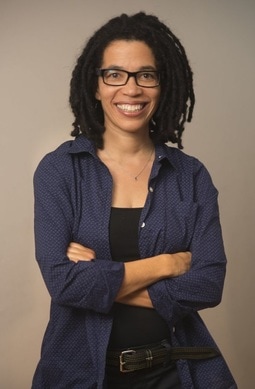
Every adoptive parent waits anxiously for the call letting them know that they have been matched with a child. So, on the most basic level, that is what “the call” refers to. The other call in the play is the “deeper calling” or the “call to courage.”
Was there any specific experience that was a catalyst for the play?
A friend of mine went through severe postpartum depression. I wondered if the whole thing was entirely hormonal – or was there a psychological component too? And, if so, you don’t have to have given birth to experience it.
You’ve said that you didn’t want to write this play and that it is very personal and close to you. When writing a play whose situations overlap your own experiences to some degree, do you worry about the play being perceived as autobiographical?
Most of my plays deal with issues or topics that I either (a) think will make a terrible play or (b) am afraid to write because they feel too personal. Usually, both. In all cases, I never end up writing autobiography because fiction is so much more dramatically compelling than my real life – and after living my life once, I don’t feel the need to re-live it in story. But, there is often a seed of personal experience in what I write about. I wrote The Call after adopting two children. People almost always think my plays are MUCH more autobiographical than they are. This used to frustrate me because I couldn’t actually get credit for the storytelling. But, now, I just take it as a compliment.
Things have and are changing very rapidly in regards to some of the subjects that your play engages. Do you feel as if it will retain its power and relevance in five or ten years?
More than anything, the play is about a couple at a crossroad. When writing, I’m not concerned with the story’s contemporary details. What interests me are relationships and the ways in which we navigate “being with each other” over time.
You’ve spoken about how this play is different from your previous plays, in which you have written about “the African-American experience through history” while The Call is a “contemporary play.” Do you think you will write more “contemporary” plays?
My most recent play, Bright Half Life, is also contemporary. It’s very different than The Call. It’s a two-hander and structurally non-linear. It’s my most intimate play. I try not to repeat myself too much when writing. I don’t want to write the same story over and over. I try to challenge myself by finding new ways to explore resonant material.
You have spoken about the writing of this play breaking a block you were experiencing.
I tend to go through periods of writer’s block as I’m figuring out what’s next. Sometimes the block is quite brief and sometimes longer. Certainly, after becoming a parent, I had to reinvent myself as a writer. On a very practical level, I had very little time to write. I wrote The Call between 4am and 6am (before the kids woke up and before I went to my day job). I also found myself drawn to different themes: marriage, parenthood, midlife, etc.
A play like this will resonate very personally with many in the audience. Have there been any responses you have received from audience members that have been particularly meaningful to or memorable for you?
All responses are meaningful to me. I have been particularly struck by the high school teenage groups that saw the play. The fact that they found it moving and engaging meant a lot to me.
Do you ever have an impulse to revise a finished, even published, script after you have seen other productions of it?
Barfield: Yes, I always want to revise my plays after they are produced or published. Theatre is a living, breathing thing. It never feels done to me. So, in some ways, I don’t enjoy seeing my work after it opens because I always find things I want to rewrite. I change the script all through previews. With the NYC production, we had a very long preview period and I brought in new pages every day. The actors had to learn new lines in the afternoon and perform them that evening. So, audiences that saw the play during early previews saw a different play than those that saw it after opening.
How has parenthood changed you as a writer, as an artist?
I think I’m a better writer post-parenthood. The breadth of my life experience has grown, life has more intrinsic value to me, I’m less “me” focused. As a parent, life is joyful and painful in a very different way.
You describe one of the play’s concerns (“doubt surrounding motherhood”) as a taboo subject. Could you talk a little about the importance, in theatre in particular, of engaging difficult or taboo material?
I tend to think of the best plays as inherently boundary-pushing and confessional in nature. Even comedies. That’s why so many farces are about infidelity or secrets. We go to theatre not to see everyday as it is. We go for two hours or so to see very high moments or very low moments (the most pivotal moments) of a character’s entire life. If we’re not seeing something that’s on the edge of our comfort zone, we’re usually bored. At least, I am. I’m not saying that I like shock-value plays for shock’s sake. I mean that I like stories in which characters are trying to balance on a precipice – any minute they could fall.
Interview reprinted from DC Theatre Scene, 2015.



